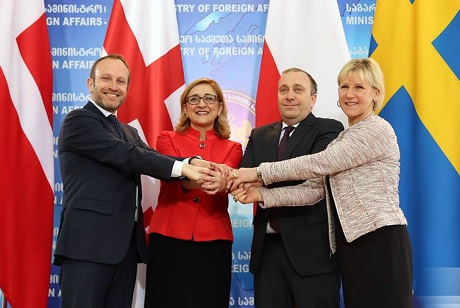EU foreign ministers support Georgia, yet push for further reforms

The European Union (EU) will never give the green light to legalise Russian occupation, say three EU foreign ministers who are on an official visit to Tbilisi.
Today Martin Lidegaard of Denmark, Grzegorz Schetyna of Poland and Margot Wallstrom of Sweden are in the Georgian capital Tbilisi to express their support towards the country as it moves towards European and Euro-Atlantic integration.
The three EU Ministers met their Georgian counterpart Tamar Beruchashvili and reconfirmed the EU’s "firm support” for Georgia, as well as Denmark, Poland and Sweden’s individual solidarity towards the country and its EU ambitions.
The three officials sent several messages to the host nation, which included:
- Denmark, Poland and Sweden cannot guarantee anything but they will spare no effort for Georgia to be granted visa free travel with the EU at the Riga Summit in May;
- The EU’s door remains open for Georgia but the country first needs to meet all requirements written in the Association Agreement, which was signed last June.
- The EU recognises all Georgian efforts but encourages the country to continue its judiciary reform.
The situation in Georgia’s two breakaway regions, Abkhazia and Tskhinvali region (South Ossetia) was heavily discussed by the four ministers.
The Danish Foreign Minister said the EU had a "very clear approach” to this issue.
"We will never take a step which will make the Russian occupation legitimate and acceptable,” Lidegaard said.
He said he supported the idea of maintaining sanctions against Russia and added these sanctions could be eased only after the situation improved.
"I don’t think time works in favour of the Russian economy. On the contrary, each day, full of sanctions, harms it,” he said.
Meanwhile Sweden’s Foreign Minister called Russia’s actions in Georgia a "violation of international law norms” and said the main thing now was to keep unity inside the EU.
While talking about possible answers to the Russian aggression, the Polish Foreign Minister said Georgia could make more of an effort to strengthen and modernise its army, just as Poland did even before Russia’s actions in Donbass, Ukraine.
Meanwhile the Danish Minister suggested creating independent Russian-language media outlets to counter the Russian media propaganda, which was targeted towards millions of people in Russia and overseas.
The three ministers are scheduled to meet other Georgian officials and non-governmental sector representatives before they leave the country later today.
 Tweet
Tweet  Share
Share